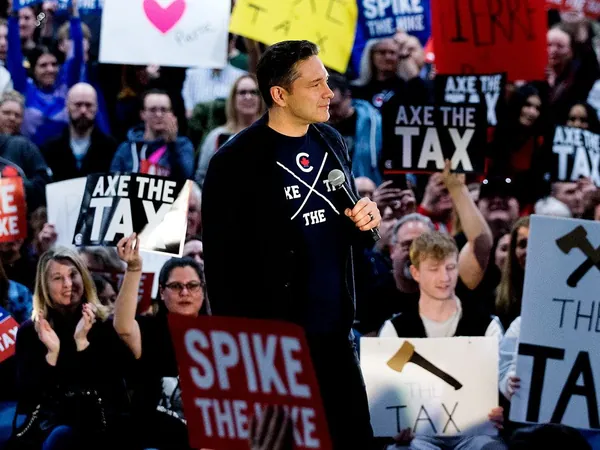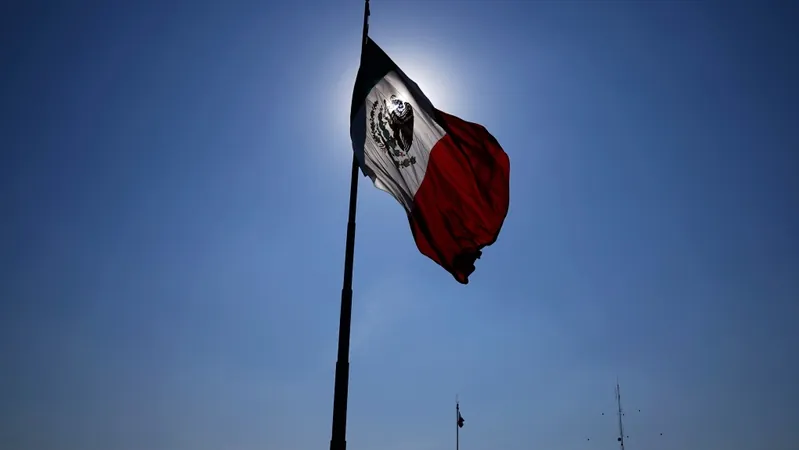
Trudeau's 'Team Canada' Strategy Faces Tough Challenge as Poilievre Unleashes Criticism Amid Trump’s Return
2024-11-09
Author: Emily
Intro
As Prime Minister Justin Trudeau seeks to revitalize his 'Team Canada' approach in the wake of Donald Trump's second presidency, there is a looming challenge: Conservative leader Pierre Poilievre is not ready to play nice. Trudeau initially pointed towards a collaborative future amidst international tensions, but Poilievre has swiftly countered with harsh criticisms of Trudeau’s previous handling of U.S.-Canada relations.
Poilievre's Criticisms
In his recent statements, Poilievre has criticized Trudeau’s carbon tax, suggesting it undermines Canada’s competitive edge in a global market. He’s also vocal about Trudeau's perceived inability to mitigate potential tariffs the Trump administration may impose on Canadian exports like softwood lumber. This exchange isn't just political posturing; it signals a turbulent period ahead for Canada as it navigates a renewed partnership with the U.S. under Trump's leadership.
Shifting Dynamics
Trudeau's government spent much of the preceding year casting Poilievre in a negative light by drawing parallels between him and Trump, especially regarding his contentious relationship with the media. However, as Trump prepares to take the reins again, the dynamics have shifted. It appears the Conservatives are attempting to seize the moment to shift the blame onto Trudeau for past decisions while also questioning his ability to navigate future engagements with a potentially volatile U.S. president.
Freeland's Response
Deputy Prime Minister Chrystia Freeland, a key player in the Liberal strategy, recently referred to Poilievre's faction as “maple syrup MAGA,” cleverly invoking Trump’s famous slogan while mocking the Conservatives. Nevertheless, during a cabinet meeting addressing Canada-U.S. relations, Freeland emphasized the potential for cooperative efforts across party lines, harkening back to moments during Trump’s first administration when Liberal and Conservative leaders collaborated on trade policy.
Cross-Party Alliances
Drawing upon experiences from previous administrations, important figures like former Conservative interim leader Rona Ambrose have demonstrated how cross-party alliances can strengthen Canada’s position. Ambrose played a significant role during the renegotiation of NAFTA, and Freeland acknowledges her contributions as integral to what she called a 'Team Canada' effort. However, the political landscape has evolved since then, with polarization increasing dramatically and the Conservatives currently enjoying a surge in popularity.
Poilievre's Dilemma
As Poilievre steers his party towards the upcoming election, he faces a unique dilemma. He must balance his critiques of Trudeau's administration without jeopardizing his party's future relationship with the Trump administration. The potential for cooperation exists, as some Conservatives maintain personal ties with influential American lawmakers.
Trade Interests
Moreover, former Alberta Premier Jason Kenney encourages Poilievre to proactively establish relations that could benefit Canada’s trade interests, recalling how past leaders have successfully engaged with U.S. administrations. The current attention on NATO spending, particularly the pressure for Canada to meet its two percent expenditure goal, represents another point of contention that both parties must navigate.
Conclusion
With this backdrop, the upcoming months promise to be challenging for the Liberals as they attempt to reposition themselves amidst a complex political landscape while the Conservatives capitalize on any missteps. As the seemingly relentless battle heats up, one thing remains clear: the next phase of Canada-U.S. relations will not be a simple one, especially with a former president like Trump back in the White House. Will Trudeau be able to rally support and steer Canada through this turbulent terrain, or will Poilievre's critiques lead to significant shifts in political allegiance? Only time will tell as both parties gear up for an election year focused on leadership, strategy, and the ever-evolving relationship with the U.S.









 Brasil (PT)
Brasil (PT)
 Canada (EN)
Canada (EN)
 Chile (ES)
Chile (ES)
 España (ES)
España (ES)
 France (FR)
France (FR)
 Hong Kong (EN)
Hong Kong (EN)
 Italia (IT)
Italia (IT)
 日本 (JA)
日本 (JA)
 Magyarország (HU)
Magyarország (HU)
 Norge (NO)
Norge (NO)
 Polska (PL)
Polska (PL)
 Schweiz (DE)
Schweiz (DE)
 Singapore (EN)
Singapore (EN)
 Sverige (SV)
Sverige (SV)
 Suomi (FI)
Suomi (FI)
 Türkiye (TR)
Türkiye (TR)